Related Research Articles

The Uyghurs, alternatively spelled Uighurs, Uygurs or Uigurs, are a Turkic ethnic group originating from and culturally affiliated with the general region of Central and East Asia. The Uyghurs are recognized as the titular nationality of the Xinjiang Uyghur Autonomous Region in Northwest China. They are one of China's 55 officially recognized ethnic minorities. The Uyghurs are recognized by the Chinese government as a regional minority and the titular people of Xinjiang.

Uyghur or Uighur is a Turkic language written in a Uyghur Perso-Arabic script with 8–13 million speakers, spoken primarily by the Uyghur people in the Xinjiang Uyghur Autonomous Region of Western China. Apart from Xinjiang, significant communities of Uyghur speakers are also located in Kazakhstan, Pakistan, Kyrgyzstan, and Uzbekistan, and various other countries have Uyghur-speaking expatriate communities. Uyghur is an official language of the Xinjiang Uyghur Autonomous Region; it is widely used in both social and official spheres, as well as in print, television, and radio. Other ethnic minorities in Xinjiang also use Uyghur as a common language.

Rebiya Kadeer is an ethnic Uyghur businesswoman and political activist. Born in Altay City, Xinjiang, Kadeer became a millionaire in the 1980s through her real estate holdings and ownership of a multinational conglomerate. Kadeer held various positions in the National People's Congress in Beijing and other political institutions before being arrested in 1999 for, according to Chinese state media, sending confidential internal reference reports to her husband, who worked in the United States as a pro-East Turkistan independence broadcaster. After she fled to the United States in 2005 on compassionate release, Kadeer assumed leadership positions in overseas Uyghur organizations such as the World Uyghur Congress.
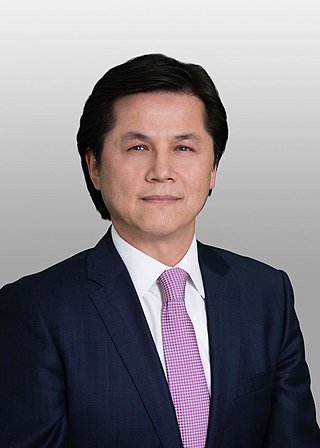
Nury Ablikim Turkel is an American attorney, public official and human rights advocate based in Washington, D.C. He is currently Chair of the United States Commission on International Religious Freedom (USCIRF).
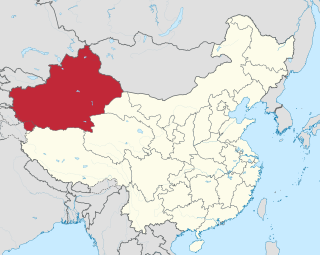
The Xinjiang conflict, also known as the East Turkistan conflict, Uyghur–Chinese conflict or Sino-East Turkistan conflict, is an ongoing ethnic geopolitical conflict in what is now China's far-northwest autonomous region of Xinjiang, also known as East Turkistan. It is centred around the Uyghurs, a Turkic ethnic group who constitute a plurality of the region's population.

The Xinjiang internment camps, officially called vocational education and training centers by the government of China, are internment camps operated by the government of Xinjiang and the Chinese Communist Party Provincial Standing Committee. Human Rights Watch says that they have been used to indoctrinate Uyghurs and other Muslims since 2017 as part of a "people's war on terror", a policy announced in 2014. The camps have been criticized by the governments of many countries and human rights organizations for alleged human rights abuses, including mistreatment, rape, and torture, with some of them alleging genocide. Some 40 countries around the world have called on China to respect the human rights of the Uyghur community, including countries such as Canada, Germany, Turkey and Japan. The governments of more than 35 countries have expressed support for China's government. Xinjiang internment camps have been described as "the most extreme example of China's inhumane policies against Uighurs".
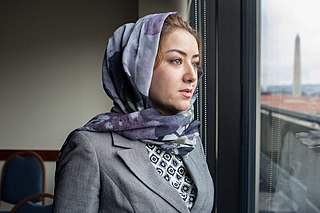
Mihrigul Tursun or Mehrigul Tursun, is a reported former Uyghur detainee from Xinjiang, China. After immigrating to the United States in 2018, Tursun claimed that she was taken into the custody of Chinese authorities several times, including being imprisoned at one of a network of political "re-education camps" for Uyghurs, subject to torture, and that one of her sons died while she was in the custody of Chinese authorities in 2015. Her story was widely reported in international media. In 2019 Hua Chunying of the Ministry of Foreign Affairs of the People's Republic of China denied Tursun's allegations and gave the Ministry's own account of events.
Civil Servant-Family Pair Up, also known as Pair Up and Become Family, is a Chinese government policy that forces designated Uyghur families to be matched with Han Chinese civil servants, with the families forced to host the civil servants in their home. Since the late 2010s, China has vigorously promoted the policy in Xinjiang. Beginning in 2018, over one million Chinese government workers began forcibly living in the homes of Uyghur families to monitor and assess resistance to cultural assimilation as well as to surveil religious and cultural practices. According to the official state perspective, the policy is to provide Mandarin language training as a way to better integrate Uyghurs and as a means for the poverty alleviation of the region. Policies bearing the same name have also been implemented in impoverished regions in Anhui, Tibet, as well as for left-behind children, widowed elders, the disabled, and in earthquake-affected regions.

The Chinese government is committing a series of ongoing human rights abuses against Uyghurs and other ethnic and religious minorities in Xinjiang that is often characterized as persecution or as genocide. Beginning in 2014, the Chinese government, under the administration of Chinese Communist Party (CCP) General Secretary Xi Jinping, incarcerated more than an estimated one million Turkic Muslims without any legal process in internment camps. Operations from 2016 to 2021 were led by Xinjiang CCP Secretary Chen Quanguo. It is the largest-scale detention of ethnic and religious minorities since World War II. The Chinese government began to wind down the camps in 2019. Amnesty International states that detainees have been increasingly transferred to the formal penal system.

The Uyghur Human Rights Policy Act of 2020 is a United States federal law that requires various United States government bodies to report on human rights abuses by the Chinese Communist Party (CCP) and the Chinese government against Uyghurs in Xinjiang, China, including internment in the Xinjiang re-education camps.
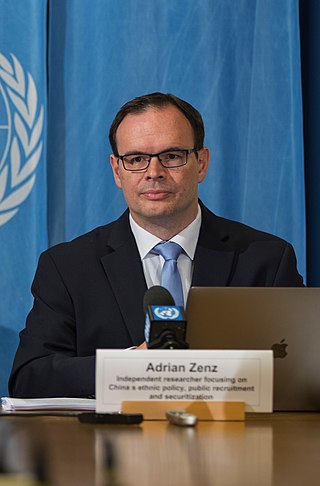
Adrian Nikolaus Zenz is a German anthropologist known for his studies of the Xinjiang internment camps and persecution of Uyghurs in China. He is a director and senior fellow in China studies at the Victims of Communism Memorial Foundation, an anti-communist think tank established by the US government and based in Washington, DC.

Rushan Abbas is a Uyghur American activist and advocate from the Xinjiang Uyghur Autonomous Region in China. She is the founder and executive director of the nonprofit Campaign for Uyghurs. Abbas became one of the most prominent Uyghur voices in international activism following her sister's detainment by the Chinese government in 2018.

Gulchehra "Guli" A. Hoja is a Uyghur–American journalist who has worked for Radio Free Asia since 2001. In November 2019, Hoja received the Magnitsky Human Rights Award for her reporting on the ongoing human rights crisis in Xinjiang and in 2020, Hoja received the Courage in Journalism Award from the International Women's Media Foundation and was listed among The 500 Most Influential Muslims.
Rahile Dawut is an Uyghur ethnographer known for her expertise in Uyghur folklore and traditions. Formerly a professor at Xinjiang University, where she founded the Minorities Folklore Research Centre, she was disappeared by the Chinese government in 2017 and has not been seen since. In 2023, Rahile received a life sentence for "endangering state security".
Uyghur or Uighur literature comprises oral compositions and written texts in the Uyghur language, a Turkic language used primarily by the Uyghur people in the Xinjiang Uyghur Autonomous Region of the People's Republic of China.

Tursunay Ziyawudun, born in Kunes of Xinjiang, is a former Uyghur detainee in one of the re-education camps in Xinjiang, China.

The Uyghur Tribunal was an independent "people's tribunal" based in the United Kingdom aiming to examine evidence regarding the ongoing human rights abuses against the Uyghur people by the Government of China and to evaluate whether the abuses constitute genocide under the Genocide Convention. The tribunal was chaired by Geoffrey Nice, the lead prosecutor in the trial of Slobodan Milošević, who announced the creation of the tribunal in September 2020.
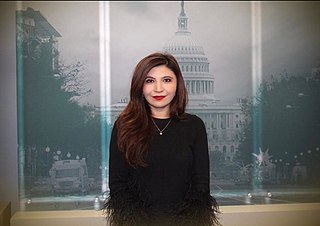
Rayhan Asat is a Uyghur lawyer and human rights advocate. Since 2020, she has led a public campaign for the release of her brother, Ekpar Asat, who has been held in the Xinjiang internment camp system since 2016, and on behalf of the Uyghurs and other ethnic minorities in China. In 2021, she joined the Strategic Litigation Project at the Atlantic Council as a Nonresident Senior Fellow and became a Yale World Fellow. Asat is also a Senior Fellow at the Raoul Wallenberg Centre for Human Rights and President of the American Turkic International Lawyers Association.
Nurmuhemmet Tohti was a prominent Uyghur writer.
The OHCHR Assessment of human rights concerns in the Xinjiang Uyghur Autonomous Region, People's Republic of China is a report published on 31 August 2022 by the Office of the United Nations High Commissioner for Human Rights (OHCHR) concerning the treatment of Uyghurs and other largely Muslim groups in China. The report concluded that "[t]he extent of arbitrary and discriminatory detention of members of Uyghur and other predominantly Muslim groups, pursuant to law and policy, in context of restrictions and deprivation more generally of fundamental rights enjoyed individually and collectively, may constitute international crimes, in particular crimes against humanity." Human rights commissioner Michelle Bachelet released the report shortly before leaving the office.
References
- 1 2 3 4 5 6 7 8 Freeman, Joshua L. "Uighur Poets on Repression and Exile". The New York Review of Books. Retrieved 9 November 2020.
- 1 2 Serhan, Story by Yasmeen. "Saving Uighur Culture From Genocide". The Atlantic. ISSN 1072-7825 . Retrieved 9 November 2020.
- ↑ "The Capital of East Turkestan Is Now in Turkey". News About Turkey. Retrieved 9 November 2020.
- ↑ "Corona, Moria und unser europäisches Wir". cms.falter.at. Retrieved 9 November 2020.
- ↑ "Uygurs reflect on 10th anniversary of deadly riots in Xinjiang". South China Morning Post. 5 July 2019. Retrieved 9 November 2020.
- ↑ "'The Night Is Thick': Uyghur Poets Respond To The Disappearance Of Their Relatives". World Uyghur Congress. 7 March 2019. Retrieved 9 November 2020.
- 1 2 "Relatives of China's oppressed Muslim minority are getting blocked online by their own family members, who are terrified to even tell them how bad their lives are". Campaign for Uyghurs. 17 May 2019. Retrieved 9 November 2020.
- ↑ "BBC 100 Women 2020: Who is on the list this year?". BBC News. 23 November 2020. Retrieved 23 November 2020.
- ↑ "Missing you is painful". www.goodreads.com. Retrieved 9 November 2020.